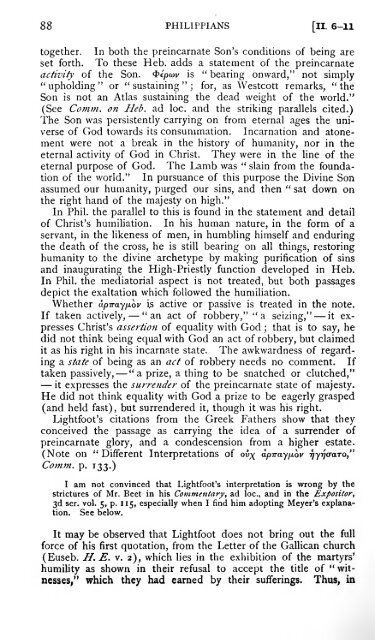Philippians and Philemon - MR Vincent - 1906.pdf
Philippians and Philemon - MR Vincent - 1906.pdf
Philippians and Philemon - MR Vincent - 1906.pdf
You also want an ePaper? Increase the reach of your titles
YUMPU automatically turns print PDFs into web optimized ePapers that Google loves.
88 PHILIPPIANS [ll. 6-11<br />
together. In both the preincarnate Son's conditions of being are<br />
set forth. To these Heb. adds a statement of the preincarnate<br />
activity of the Son. is " bearing onward," not simply<br />
"upholding" or "sustaining"; for, as Westcott remarks, "the<br />
Son is not an Atlas sustaining the dead weight of the world."<br />
(See Comm. on Heb. ad loc. <strong>and</strong> the striking parallels cited.)<br />
The Son was persistently carrying on from eternal ages the universe<br />
of God towards its consummation. Incarnation <strong>and</strong> atonement<br />
were not a break in the history of humanity, nor in the<br />
eternal activity of God in Christ. They were in the hne of the<br />
eternal purpose of God. The Lamb was " slain from the foundation<br />
of the world." In pursuance of this purpose the Divine Son<br />
assumed our humanity, purged our sins, <strong>and</strong> then " sat down on<br />
the right h<strong>and</strong> of the majesty on high."<br />
In Phil, the parallel to this is found in the statement <strong>and</strong> detail<br />
of Christ's humiliation. In his human nature, in the form of a<br />
servant, in the likeness of men, in humbling himself <strong>and</strong> enduring<br />
the death of the cross, he is still bearing on all things, restoring<br />
humanity to the divine archetype by making purification of sins<br />
<strong>and</strong> inaugurating the High-Priestly function developed in Heb.<br />
In Phil, the mediatorial aspect is not treated, but both passages<br />
depict the exaltation which followed the humiliation.<br />
Whether is active or passive is treated in the note.<br />
If taken actively, — "an act of robbery," "a seizing," — it expresses<br />
Christ's assertion of equality with God ; that is to say, he<br />
did not think being equal with God an act of robbery, but claimed<br />
it as his right in his incarnate state. The awkwardness of regard-<br />
ing a state of being as an act of robbery needs no comment. If<br />
taken passively,— "a prize, a thing to be snatched or clutched,"<br />
— it expresses the surrender of the preincarnate state of majesty.<br />
He did not think equality with God a prize to be eagerly grasped<br />
(<strong>and</strong> held fast), but surrendered it, though it was his right.<br />
Lightfoot's citations from the Greek Fathers show that they<br />
conceived the passage as carrying the idea of a surrender of<br />
preincarnate glory, <strong>and</strong> a condescension from a higher estate.<br />
(Note on "Different Interpretations of ,"<br />
Comm. p. 133.)<br />
I am not convinced that Lightfoot's interpretation is wrong by the<br />
strictures of Mr. Beet in his Commentary, ad loc, <strong>and</strong> in the Expositor,<br />
3d ser. vol. 5, p. 115, especially when I find him adopting Meyer's explanation.<br />
See below.<br />
It may be observed that Lightfoot does not bring out the full<br />
force of his first quotation, from the Letter of the Galilean church<br />
(Euseb. H. E. v. 2), which lies in the exhibition of the martyrs'<br />
humility as shown in their refusal to accept the title of " wit-<br />
nesses," which they had earned by their sufferings. Thus, in





